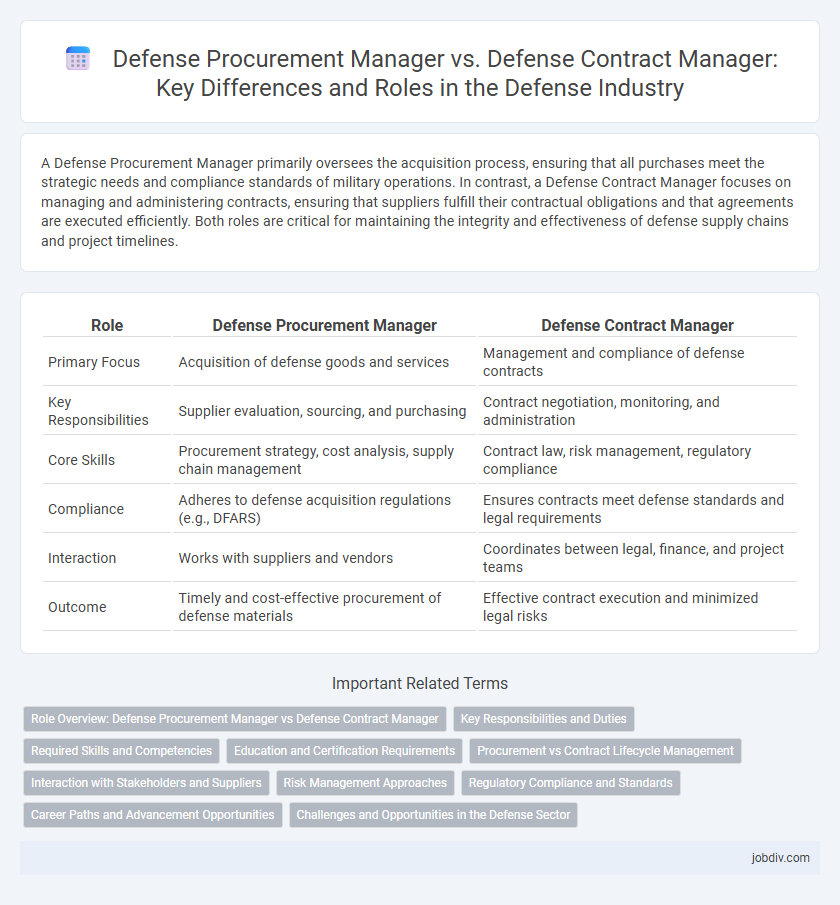A Defense Procurement Manager primarily oversees the acquisition process, ensuring that all purchases meet the strategic needs and compliance standards of military operations. In contrast, a Defense Contract Manager focuses on managing and administering contracts, ensuring that suppliers fulfill their contractual obligations and that agreements are executed efficiently. Both roles are critical for maintaining the integrity and effectiveness of defense supply chains and project timelines.
Table of Comparison
| Role | Defense Procurement Manager | Defense Contract Manager |
|---|---|---|
| Primary Focus | Acquisition of defense goods and services | Management and compliance of defense contracts |
| Key Responsibilities | Supplier evaluation, sourcing, and purchasing | Contract negotiation, monitoring, and administration |
| Core Skills | Procurement strategy, cost analysis, supply chain management | Contract law, risk management, regulatory compliance |
| Compliance | Adheres to defense acquisition regulations (e.g., DFARS) | Ensures contracts meet defense standards and legal requirements |
| Interaction | Works with suppliers and vendors | Coordinates between legal, finance, and project teams |
| Outcome | Timely and cost-effective procurement of defense materials | Effective contract execution and minimized legal risks |
Role Overview: Defense Procurement Manager vs Defense Contract Manager
A Defense Procurement Manager is responsible for sourcing, negotiating, and acquiring defense-related goods and services, ensuring compliance with military standards and budget constraints. In contrast, a Defense Contract Manager oversees the administration and fulfillment of defense contracts, managing vendor performance, contract terms, and regulatory compliance throughout the contract lifecycle. Both roles require expertise in defense acquisition regulations and strong coordination with suppliers and government agencies.
Key Responsibilities and Duties
A Defense Procurement Manager oversees the acquisition of goods and services, ensuring compliance with government regulations and budget constraints while managing supplier relationships and evaluating bids to secure cost-effective contracts. In contrast, a Defense Contract Manager focuses on administering and monitoring defense contracts post-award, ensuring all contract terms, performance metrics, and regulatory requirements are met throughout the contract lifecycle. Both roles require expertise in federal acquisition regulations (FAR) and strong negotiation skills, but the Procurement Manager emphasizes sourcing and procurement strategy, while the Contract Manager centers on contract execution and compliance.
Required Skills and Competencies
A Defense Procurement Manager must possess strong negotiation skills, in-depth knowledge of supply chain management, and expertise in regulatory compliance to acquire military equipment efficiently. In contrast, a Defense Contract Manager requires proficiency in contract law, risk assessment, and performance evaluation to ensure contractual obligations are met and projects stay within budget. Both roles demand exceptional analytical thinking, communication skills, and familiarity with defense acquisition regulations such as the Federal Acquisition Regulation (FAR).
Education and Certification Requirements
Defense Procurement Managers typically require a bachelor's degree in supply chain management, business administration, or a related field, often complemented by certifications like Certified Professional in Supply Management (CPSM). Defense Contract Managers usually hold a degree in contract management, law, or business, with certifications such as the Certified Federal Contracts Manager (CFCM) or Certified Commercial Contracts Manager (CCCM) being highly valued. Both roles benefit from specialized training in federal acquisition regulations and defense procurement policies to ensure compliance and effective contract administration.
Procurement vs Contract Lifecycle Management
A Defense Procurement Manager focuses on sourcing and acquiring goods, services, and technology essential to military operations while ensuring compliance with budget and regulations. In contrast, a Defense Contract Manager oversees the entire contract lifecycle, from negotiation and execution to performance monitoring and compliance enforcement. The Procurement role emphasizes vendor selection and purchase efficiency, whereas Contract Lifecycle Management centers on maintaining contractual obligations and mitigating risks throughout the agreement duration.
Interaction with Stakeholders and Suppliers
A Defense Procurement Manager strategically collaborates with suppliers to source materials and services that meet military specifications while ensuring cost-efficiency and compliance with regulatory standards. In contrast, a Defense Contract Manager focuses on overseeing contract execution, managing supplier performance, and maintaining clear communication with stakeholders to resolve issues and mitigate risks. Effective interaction between these roles enhances supply chain reliability and aligns procurement activities with defense operational goals.
Risk Management Approaches
Defense Procurement Managers focus on mitigating supply chain risks through strategic sourcing and vendor evaluation to ensure timely delivery of critical defense materials. Defense Contract Managers prioritize contractual risk management by overseeing compliance, monitoring contract performance, and negotiating risk clauses that safeguard government interests. Both roles implement rigorous risk assessment frameworks, but Procurement Managers emphasize pre-award risk avoidance while Contract Managers concentrate on post-award risk control and dispute resolution.
Regulatory Compliance and Standards
Defense Procurement Managers oversee acquiring military equipment and services, ensuring all contracts meet Department of Defense (DoD) regulations and Federal Acquisition Regulation (FAR) standards. Defense Contract Managers focus on administering and monitoring contract performance, enforcing compliance with contract terms, government standards, and regulatory requirements like the Defense Federal Acquisition Regulation Supplement (DFARS). Both roles require detailed knowledge of regulatory frameworks to mitigate risks and ensure contract integrity in defense acquisitions.
Career Paths and Advancement Opportunities
Defense Procurement Managers specialize in acquiring military equipment and services, focusing on negotiating contracts and ensuring compliance with defense regulations. Defense Contract Managers oversee contract execution, monitor contractor performance, and manage risk mitigation throughout the project lifecycle. Career advancement for Procurement Managers often leads to senior roles in supply chain leadership, while Contract Managers may progress to strategic positions in contract administration or defense program management.
Challenges and Opportunities in the Defense Sector
Defense Procurement Managers face challenges in ensuring compliance with complex regulations while securing cost-effective acquisition of advanced military technology, creating opportunities to leverage strategic supplier relationships and streamline supply chain processes. Defense Contract Managers specialize in managing contract lifecycle risks, negotiating terms, and ensuring performance adherence, offering opportunities to optimize contract outcomes and enhance transparency through digital contract management tools. Both roles demand robust understanding of government policies and market dynamics to drive innovation and mission readiness in the defense sector.
Defense Procurement Manager vs Defense Contract Manager Infographic

 jobdiv.com
jobdiv.com